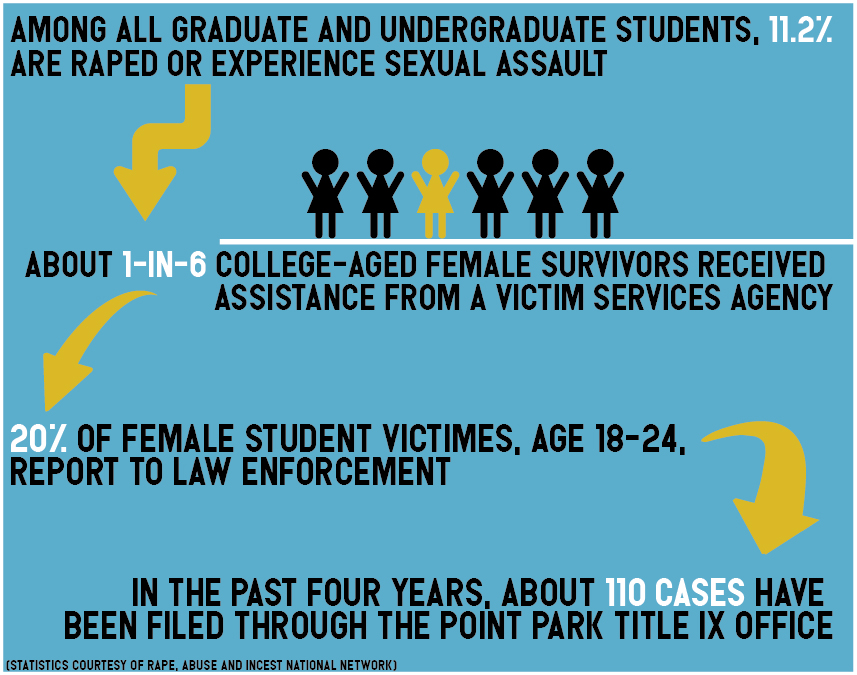Mental health concern for victims of sexual abuse
#MeToo movement raises awareness, brings support to victims
Photo by Isabelle Opsitos
February 13, 2018
With a wave of high-profile victims professing their own personal experiences of sexual harassment and abuse, the #MeToo movement, revived from its original campaign in the 1990s, has revitalized a deeper conversation about what it means for women who have been abused, and how they can recover.
Mental health has been a growing conversation in society as well, no longer stigmatized as something “embarrassing,” but an opportunity to build support for those plagued by the often debilitating effects.
These two problems have a linear connection – sexual abuse can lead to mental health issues including feelings of anxiety, depression, post-traumatic stress disorder and even physical manifestations as a result of immense stress such as headaches, stomach aches, panic attacks and elevated heart rate, according to Sarah Schultz.
“Women who experience these traumatic events often have a hard time finding support,” Schultz, a professor of psychology, said in her Point Park office on Wednesday. “This isolation can lead to depression, especially if it’s more than one instance of abuse.”
Schultz recognized the importance of this revived #MeToo movement in its ability to raise awareness of sexual abuse against women, particularly in the workplace. The support women are gaining by finding solidarity in trauma provides an avenue for change on a societal level.
“We live in a culture that doesn’t support women,” Schultz said. “Connecting victims with resources such as therapeutic support, community support groups or just listening as a non-judgmental friend can help them along the path to recovery.”
Point Park is
taking another step in raising awareness by hosting a panel of experts to discuss with students “real world scenarios” surrounding sexual abuse and harassment and how they can respond if they do encounter these situations in the workplace or on campus.
Industry professionals, professors and human resource experts will be ready to answer students’ questions on the topic. According to the press release, the event will be moderated by Sharon Eberson, online features editor of the Pittsburgh Post-Gazette. Elizabeth Rosemeyer, Title IX coordinator and Andrew Conte, director of the Center for Media Innovation will also be assisting in the event.
According to Rosemeyer, in the four years she’s been coordinator, she estimates filing around 110 case of sexual violence on campus.
Previously, Point Park has hosted various events to raise awareness and understanding of sexual abuse and harassment. The annual “Break the Silence” concert, a collaboration between Title IX and Pioneer Records has shown to be successful in the past two years.
Initiatives have also gained footing city-wide, such as Pittsburgh Action Against Rape’s program where they are training bartenders to be aware of vulnerable customers and how to help them out of threatening situations, according to clinical community intern and Point Park grad student Carleigh Mallah.
“Project Last Call is still in its early stages,” Mallah said in a phone interview last Thursday. “But we are training staff in bars across Pittsburgh on how to handle sexual harassment and how to protect their customers.”
Prevention is important, but so is helping victims of sexual violence in their time of need. One of the most challenging aspects to this wide-spread problem is there isn’t a clear solution or timeline for everybody, according to Rosemeyer.
“Victims of sexual abuse have experienced that loss of control, so it’s important to give that back to them in the recovery process,” Rosemeyer said in her office on Wednesday. “I’ll begin the process by letting them know what their options are and let them decide what is best for them personally.”
Offering to assist in finding counseling services or to file a report with the police are options that might work for some, but not others.
The stress involved with sexual abuse can affect performance and attendance in the workplace or at school as well, according to Sandra Mervosh, assistant professor of Human Resources at Point Park.
“A great part of the #MeToo Movement is that its allowed HR to launch initiatives that better address how to help victims in the workplace,” Mervosh said in her office on Feb. 5.
Issues like substance abuse, self-harm and eating disorders can also follow a traumatic event of sexual violence.
“This is something victims can struggle with for a lifetime,” Schultz said. “There can be good days and bad days; they need to find out what is right for them in managing the stress.”
Schultz suggests avenues such as journaling, taking a walk or meditating as therapeutic options of healing.
“That person needs to figure out what triggers those feelings that still remain; anxiety is a train easily derailed,” she said.
Education seems to be a defining element in achieving an overall societal shift to end the cycle of sexual abuse. Mervosh mentioned that even a clearer definition of sexual abuse can help aid in a cultural shift.
Schultz specified there is no room for victim blaming in this process of solving the problem of sexual violence.
“A woman’s decision to dress a certain way or go somewhere doesn’t justify assault,” Schultz said. “Why do we teach girls how not to get raped and don’t teach boys not to rape?”
#Metoo: What’s Next? Preparing Students for the Professional World and Changing Workplace Cultures was canceled due to inclement weather. The rescheduled date has yet to be announced.



















